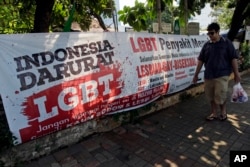Asia's youngest nation, East Timor (Timor-Leste), held its second annual LGBT pride parade in its capital, Dili.
The small country cemented its role as a regional LGBT rights leader during a time when that community is under threat in many of its neighboring countries, such as Indonesia and Malaysia.
East Timor's pride campaign is notable for its broad base of support in a country of fewer than 1.3 million people. Last year, its prime minister, Rui Maria de Araujo, supported the fledgling movement, stating that "discrimination, disrespect and abuse toward people, because of their sexual orientation or gender identity, does not provide any benefit to our nation."
This year, the campaign started early with a documentary film on LGBT acceptance within families that was released in April for an audience that included former president and prime minister Xanana Gusmao. It was filmed by the community advocacy group Hatutan.
"Kinship is an important issue for the LGBT community in East Timor because it's such a small country," said Dede Oetomo, who founded the Indonesian gay rights advocacy group Gaya Nusantara.
This year's parade, held July 21, had about 1,500 participants — up from 500 last year — and had "more participation from LGBT community members, especially the transgender and the lesbian community," said Natalino Guterres, an activist who spearheaded both parades. "It was great to see people of all generations coming to walk together."
Small but powerful
Pride 2018 was larger but also more complicated, said Guterres.
"Last year, people weren't really sure what was going on, but this year they knew that it was an LGBTI pride parade. Some opponents are becoming more vocal … and some even threaten us by using phrases like 'trash of the society,'" he said.
Over the weekend, a local band led LGBT marchers in a traditional Timorese resistance song and participants spontaneously held hands, danced in a circle, and cried "tears of happiness," Guterres said.
East Timor became fully independent in 2002, and many citizens still have memories of the nationalist struggle against Indonesia. The dance circle showed that the movement was "truly Timorese," said Guterres. "We showed that we are also a part of this country, and that our friends and families are also proud of us to come out to march with us in solidarity."
Guterres was surprised by the turnout, and moved by one visitor in particular: his mother. He didn't realize she was there until after the fact, when friends informed him that they had seen her.
"Just last year we had a discussion where [my parents] made me promise to be normal,'" he said. "So it was amazing to find out that she also went."
Mixed fortunes
Oetomo, who advocates for LGBT rights across Southeast Asia, said that East Timor activists have quietly been growing a movement for many years.
"In 2002, protection from discrimination based on sexual orientation almost made it into the constitution," he said. "Timorese people have been freedom fighters, they know how to fight for their rights."
Plus, said Oetomo, "they don't have the Islam factor, to be frank, like we do in Indonesia."
Conservative Muslim groups like the Family Love Alliance and the Islamic Defenders Front have petitioned for same-sex intercourse to be outlawed and have conducted raids on private establishments, respectively.
"The Catholic Church in Timor has never really opposed LGBT rights the way Indonesia's Islamists do," Oetomo said.
Earlier this month, Human Rights Watch released a landmark report on the rapid decline of LGBT rights in Indonesia, East Timor's largest neighbor, which occupied the country for 22 years. Indonesian police conducted at least six raids on private gatherings that included LGBT people in 2016, and apprehended at least 300 LGBT people in 2017, according to the report.
What the report shows, said Human Rights Watch researcher Kyle Knight, is how quickly the climate for LGBT rights can change in a nation.
Before January 2016, "Human rights groups like us would hold up Indonesia as an example of pluralism … where governments didn't scapegoat and goad people using the LGBT community as a political pawn," Knight said. However, that was the month when several prominent officials made anti-LGBT remarks, sparking a nationwide moral panic that continues to this day. The situation for LGBT Indonesians declined precipitously within just two-and-a-half years, he said.
But there are signs of change. Both Thailand and the Philippines may legalize same-sex marriage or partnerships, and LGBT rights are flourishing in Vietnam.
"More and more of what is happening in Timor-Leste will be happening around the region," Oetomo said.
"What Timor-Leste has accomplished is inspiring to all of us," he said. "Look, people in my organization are going to save money — in fact they've probably already started — and we will go to Dili [Pride] come 2019!"





